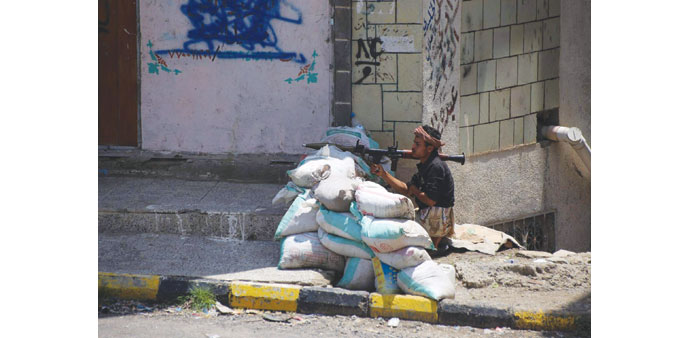Reuters
Geneva
Nearly 100 civilians have been killed in the past two weeks in Yemen’s southwestern city of Taez where a collapsing healthcare service and outbreak of dengue fever are compounding a dire humanitarian situation, the United Nations said yesterday.
Yemen’s third-largest city has become the latest frontline in a five-month war between northern Houthi militiamen and supporters of Yemen’s exiled government, which is backed by the West and Saudi Arabia.
“We are alarmed by the steep increase in the number of civil casualties in Taez in recent weeks,” UN human rights spokeswoman Cecile Pouilly told a news briefing.
An “untenable” humanitarian situation was being made worse by Houthi-linked fighters blocking supply routes into Taez city, she said.
“We are also concerned about the near collapse of the healthcare system in Taez where all six public hospitals are no longer operational due to the fighting,” she said.
Attacks by the Saudi-led coalition on Hodeidah port, a key entry point for aid supplies and commercial imports for Yemen, are complicating relief efforts, Pouilly added.
Cases in Taez of dengue fever, a mosquito-borne viral disease that can be fatal, soared from 145 in mid-August to 421 as of August 25, the World Health Organisation said.
The WHO has sent life-saving medicines to Taez, WHO spokesman Christian Lindmeier said. The agency called last week for a ceasefire and humanitarian corridor to allow access to 3.2mn people in Taez deemed at risk from fighting and disease.
“The risk of other communicable diseases like cholera also remains high especially given the poor water and sanitation conditions during this period,” he added.
Since the conflict escalated in Yemen on March 26, UN monitors have documented 6,631 civilian casualties, including 2,112 deaths.
Pouilly said the true figures could be much higher.
l Unidentified gunmen on motorbikes shot dead two leaders of the loyalist militia controlling the southern port of Aden in separate attacks yesterday, officials said.
Rasheed Khaled Saif and Hamdi al-Shutairi were military leaders of the Popular Southern Resistance, a loose alliance which fought the siege of the city by Houthi militia forces with support from Gulf Arab states.
No group immediately claimed responsibility for the killings, which followed the shooting of a senior security official in Aden on Sunday.
Militias loyal to exiled President Abd-Rabbu Mansour Hadi, who is currently based in Saudi Arabia, recaptured Aden in July.
Since then, a power vacuum has grown, with Al Qaeda militants moving into a main neighbourhood and unknown assailants blowing up the intelligence headquarters.
Residents have complained that police have largely quit the streets and that despite the victory against the Houthis, Hadi’s government has yet to return from Saudi Arabia.
Plans to set up a temporary administration in Aden have been dogged by the chaos.
“We finished the war and the Houthis, but this series of assassinations is really worrying us. There’s a security vacuum, the people hope some kind of authority can be established and the police will be deployed so we can be put at ease,” said local construction worker Mohamed Ahmed Salem.

A pro-government fighter guards a checkpoint near Taez during clashes with Houthi rebels yesterday.
